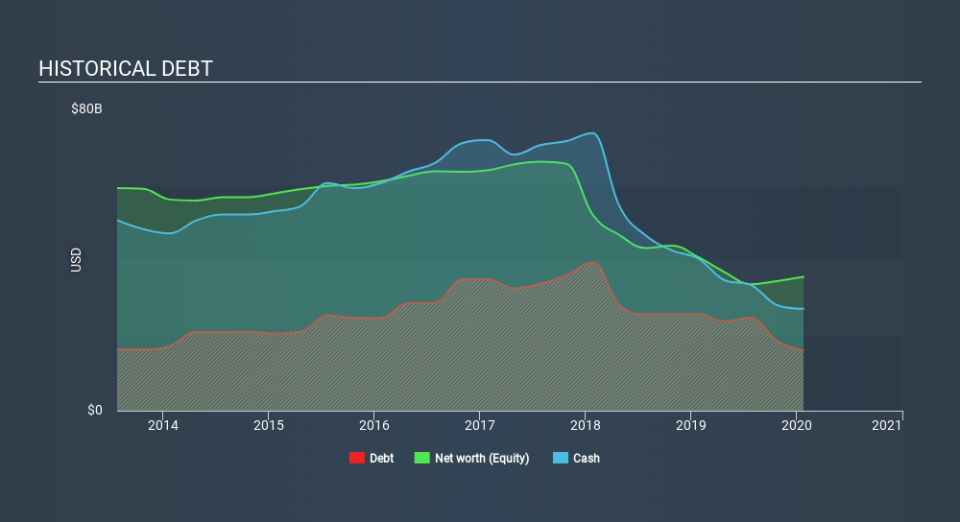Does Cisco Systems (NASDAQ:CSCO) Have A Healthy Balance Sheet?

Howard Marks put it nicely when he said that, rather than worrying about share price volatility, 'The possibility of permanent loss is the risk I worry about... and every practical investor I know worries about. So it seems the smart money knows that debt - which is usually involved in bankruptcies - is a very important factor, when you assess how risky a company is. We note that Cisco Systems, Inc. (NASDAQ:CSCO) does have debt on its balance sheet. But the real question is whether this debt is making the company risky.
What Risk Does Debt Bring?
Generally speaking, debt only becomes a real problem when a company can't easily pay it off, either by raising capital or with its own cash flow. If things get really bad, the lenders can take control of the business. However, a more usual (but still expensive) situation is where a company must dilute shareholders at a cheap share price simply to get debt under control. Of course, the upside of debt is that it often represents cheap capital, especially when it replaces dilution in a company with the ability to reinvest at high rates of return. The first thing to do when considering how much debt a business uses is to look at its cash and debt together.
View our latest analysis for Cisco Systems
What Is Cisco Systems's Net Debt?
You can click the graphic below for the historical numbers, but it shows that Cisco Systems had US$16.0b of debt in January 2020, down from US$25.7b, one year before. However, its balance sheet shows it holds US$27.1b in cash, so it actually has US$11.1b net cash.
How Strong Is Cisco Systems's Balance Sheet?
The latest balance sheet data shows that Cisco Systems had liabilities of US$22.1b due within a year, and liabilities of US$32.8b falling due after that. Offsetting this, it had US$27.1b in cash and US$9.16b in receivables that were due within 12 months. So it has liabilities totalling US$18.7b more than its cash and near-term receivables, combined.
Of course, Cisco Systems has a titanic market capitalization of US$174.5b, so these liabilities are probably manageable. Having said that, it's clear that we should continue to monitor its balance sheet, lest it change for the worse. While it does have liabilities worth noting, Cisco Systems also has more cash than debt, so we're pretty confident it can manage its debt safely.
The good news is that Cisco Systems has increased its EBIT by 7.1% over twelve months, which should ease any concerns about debt repayment. The balance sheet is clearly the area to focus on when you are analysing debt. But ultimately the future profitability of the business will decide if Cisco Systems can strengthen its balance sheet over time. So if you're focused on the future you can check out this free report showing analyst profit forecasts.
Finally, a business needs free cash flow to pay off debt; accounting profits just don't cut it. Cisco Systems may have net cash on the balance sheet, but it is still interesting to look at how well the business converts its earnings before interest and tax (EBIT) to free cash flow, because that will influence both its need for, and its capacity to manage debt. Happily for any shareholders, Cisco Systems actually produced more free cash flow than EBIT over the last three years. There's nothing better than incoming cash when it comes to staying in your lenders' good graces.
Summing up
Although Cisco Systems's balance sheet isn't particularly strong, due to the total liabilities, it is clearly positive to see that it has net cash of US$11.1b. And it impressed us with free cash flow of US$15b, being 103% of its EBIT. So is Cisco Systems's debt a risk? It doesn't seem so to us. When analysing debt levels, the balance sheet is the obvious place to start. However, not all investment risk resides within the balance sheet - far from it. To that end, you should be aware of the 2 warning signs we've spotted with Cisco Systems .
Of course, if you're the type of investor who prefers buying stocks without the burden of debt, then don't hesitate to discover our exclusive list of net cash growth stocks, today.
If you spot an error that warrants correction, please contact the editor at editorial-team@simplywallst.com. This article by Simply Wall St is general in nature. It does not constitute a recommendation to buy or sell any stock, and does not take account of your objectives, or your financial situation. Simply Wall St has no position in the stocks mentioned.
We aim to bring you long-term focused research analysis driven by fundamental data. Note that our analysis may not factor in the latest price-sensitive company announcements or qualitative material. Thank you for reading.



